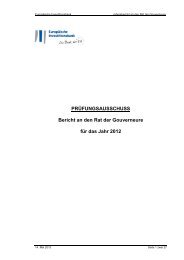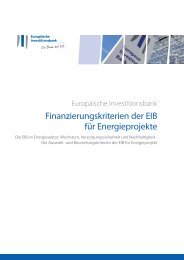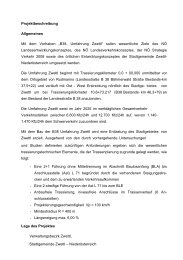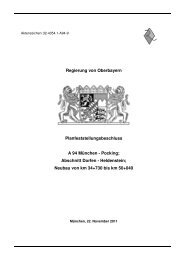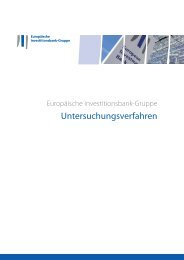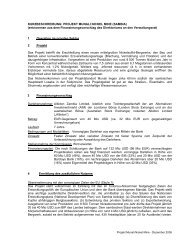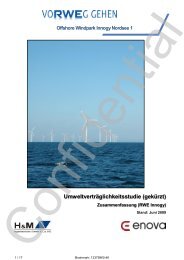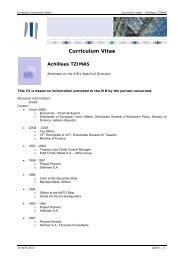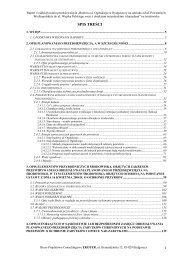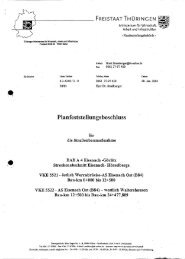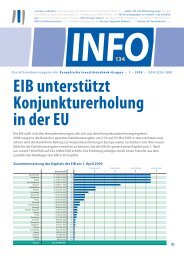EIB Papers Volume 13. n°1/2008 - European Investment Bank
EIB Papers Volume 13. n°1/2008 - European Investment Bank
EIB Papers Volume 13. n°1/2008 - European Investment Bank
You also want an ePaper? Increase the reach of your titles
YUMPU automatically turns print PDFs into web optimized ePapers that Google loves.
Where fiscal positions<br />
were sound, private<br />
investment has<br />
increased faster and<br />
foreign capital has flown<br />
in more readily than<br />
elsewhere.<br />
124 <strong>Volume</strong>13 N°1 <strong>2008</strong> <strong>EIB</strong> PAPERS<br />
countries have dropped even more steeply, achieving fiscal adjustment and a lower tax burden at<br />
the same time. Since 2001, however, only Romania and Slovakia have implemented expenditureled<br />
fiscal adjustments while revenue increases have contributed to fiscal adjustment in the Czech<br />
Republic and Poland.<br />
Fiscal adjustment has not necessarily constrained public investment. While some countries cut<br />
public investment to consolidate fiscal positions, others managed to increase public investment<br />
levels despite tighter budgets. Table 4 presents changes in the overall balance, revenues, and<br />
expenditures, during years of fiscal adjustment in the NMS, defined as those years during which the<br />
fiscal balance improved. Among 44 episodes of fiscal adjustment during 1999–2006, only 30 percent<br />
included cuts in public investment. In comparison, 53 percent involved revenue increases, and<br />
77 percent cuts in other non-investment expenditures. For example, Slovakia improved its fiscal<br />
position through cuts in both investment and other expenditure in 2003–2004, whereas Latvia<br />
implemented fiscal consolidation with higher public investment of about 0.5 percent of GDP per<br />
year in 2003–2006, supported by much enhanced revenue efforts and cuts in other expenditures.<br />
The Czech Republic, Lithuania, and Poland were also successful in both reducing fiscal deficits and<br />
increasing public investment. 5<br />
Furthermore, private investment has boosted total investment in some of the NMS, particularly<br />
those with stronger fiscal positions. There are two general patterns (Table 5). In countries with strong<br />
fiscal positions and modest debt, private investment has increased and has often more than offset<br />
cuts in public investment (e.g., Estonia). In contrast, in countries with sizeable debt and persistent<br />
fiscal deficits, private investment has declined considerably in recent years, leading to lower total<br />
investment even when public investment increased (e.g., the Czech Republic and Poland). The link<br />
between fiscal positions and private investment may be reflective of private sector perceptions of<br />
good governance (IMF 2005): Good public governance, as manifested by strong fiscal balances, also<br />
translates into lower cost of international financing for the private sector and higher foreign capital<br />
inflows (Figure 6). Similarly, pro-growth economic policy reforms have a positive knock-on effect on<br />
private investment. For example, Figure 7 shows that, in infrastructure sectors, private investment is<br />
positively related to perceived sector reforms in the NMS.<br />
It is not surprising then to find also that foreign investment has generally been more forthcoming<br />
where fiscal positions are stronger. As shown in Figure 6a, improvements in fiscal positions<br />
are generally rewarded by more favourable ratings on sovereign bonds. For example, fiscal<br />
consolidations in Lithuania in 2001-2004 and Slovakia in 2003-2005 were accompanied by bond<br />
ratings upgrades of about one notch each year. As these ratings are important benchmarks to<br />
determine access and cost of financing from the international capital markets to the private sector<br />
in the NMS, higher ratings are more likely to attract capital inflows. Figure 6b indeed indicates that<br />
net foreign capital inflows are positively associated with the fiscal balances in the NMS, offering<br />
countries an important source to finance growth notwithstanding low national savings.<br />
5 These facts are consistent with recent findings on fiscal rules for public investment in Europe. For example, Turrini (2004)<br />
argues that higher fiscal balances may help to create space for public investment, and Perée and Välilä (2005) find no<br />
evidence of a negative long-run impact of fiscal rules on public investment.




